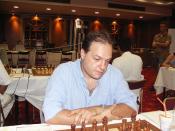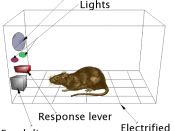Learning is any relatively permanent change in behaviour due to experience (Grivas et al, 1999: 318). Conditioning is the acquisition of specific patterns of behaviour in the presence of well-define stimuli (Termpapers, 2003: 01). Learning is the unconscious association between two stimuli which brings about stimulus substitution: Classical Conditioning, CC, Pavlov and the encoding of consequences: Operant Conditioning, OC, Skinner (Grivas et al. 1999: 346-349). This essay will compare and contrast the two learning theories, focusing on the main similarities and differences that exist.
CC (otherwise known as respondent or Pavlovian conditioning (Weiten, 2001: 222 & Copper et al, 1987: 19) was first described by Pavlov in 1899 after unintentional observations into his research of the digestive system of dogs lead him to conduct research into what is referred to now as CC; simple form of learning which occurs through repeated associations between two (or more) different stimuli (Grivas, 1999: 326) .
It occurs when a previously neutral stimulus (CS) is paired with an unconditioned stimulus (UCS) which elicits a reflex response (UCR). This results in the CS electing a conditioned response (CR) that is similar or identical to the UCR (Rachlin, 1970: 62-64). CC accounts for emotional and attitidual changes in behaviour and rids of undesired behaviours ( Grivas, 1999: 333-338).
Whilst CC provides a useful explanation of reflexive responding that is largely controlled by stimuli that precede the response (Weiten, 2001: 232 & Grivas et al, 1999: 345), behaviours which are voluntary (actively operate on the environment) cannot be explained using CC (Grivas et al, 1999: 345 & Cooper et al, 1987: 22) . Individuals learning is mainly influenced by stimulus events that follow the response, specifically its the consequences (Weiten, 2001: 232). In order to explain these complex and voluntary behaviours, another form of learning called...


